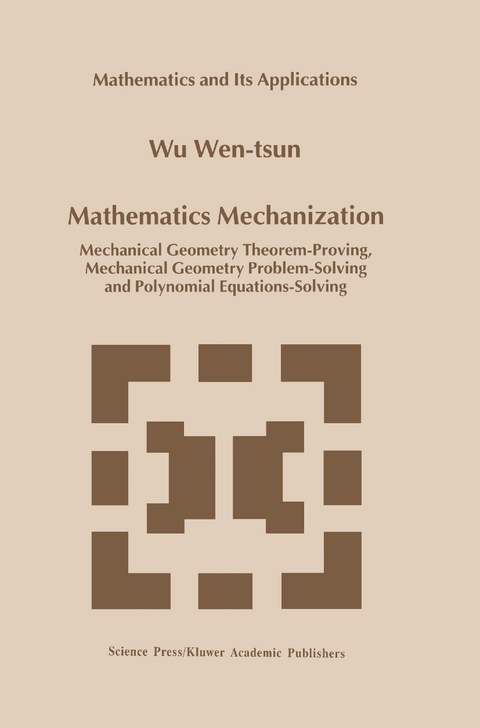
Mathematics Mechanization
Mechanical Geometry Theorem-Proving, Mechanical Geometry Problem-Solving and Polynomial Equations-Solving
Seiten
2001
Springer (Verlag)
978-0-7923-5835-0 (ISBN)
Springer (Verlag)
978-0-7923-5835-0 (ISBN)
This book is a collection of essays centred around the subject of mathematical mechanization.
Audience: This volume will be of interest to research and applied mathematicians, computer scientists and historians in mathematics.
This book is a collection of essays centred around the subject of mathematical mechanization. It tries to deal with mathematics in a constructive and algorithmic manner so that reasoning becomes mechanical, automated and less laborious.
The book is divided into three parts. Part I concerns historical developments of mathematics mechanization, especially in ancient China. Part II describes the underlying principles of polynomial equation-solving, with polynomial coefficients in fields restricted to the case of characteristic 0. Based on the general principle, some methods of solving such arbitrary polynomial systems may be found. This part also goes back to classical Chinese mathematics as well as treating modern works in this field. Finally, Part III contains applications and examples.
Audience: This volume will be of interest to research and applied mathematicians, computer scientists and historians in mathematics.
Audience: This volume will be of interest to research and applied mathematicians, computer scientists and historians in mathematics.
This book is a collection of essays centred around the subject of mathematical mechanization. It tries to deal with mathematics in a constructive and algorithmic manner so that reasoning becomes mechanical, automated and less laborious.
The book is divided into three parts. Part I concerns historical developments of mathematics mechanization, especially in ancient China. Part II describes the underlying principles of polynomial equation-solving, with polynomial coefficients in fields restricted to the case of characteristic 0. Based on the general principle, some methods of solving such arbitrary polynomial systems may be found. This part also goes back to classical Chinese mathematics as well as treating modern works in this field. Finally, Part III contains applications and examples.
Audience: This volume will be of interest to research and applied mathematicians, computer scientists and historians in mathematics.
Preface. Part I: Historical Developments. 1. Polynomial Equations-Solving in Ancient Times, Mainly in Ancient China. 2. Historical Development of Geometry Theorem-Proving and Geometry Problem-Solving in Ancient Times. Part II: Principles and Methods. 3. Algebraic Varieties as Zero-Sets and Characteristic-Set Method. 4. Some Topics in Computer Algebra. 5. Some Topics in Computational Algebraic Geometry. Part III: Applications and Examples. 6. Applications to Polynomial Equations-Solving. 7. Applications to Geometry Theorem-Proving. 8. Diverse Applications. Bibliography. Index.
| Erscheint lt. Verlag | 30.4.2001 |
|---|---|
| Reihe/Serie | Mathematics and Its Applications ; 489 | Mathematics and Its Applications ; 489 |
| Zusatzinfo | XII, 420 p. |
| Verlagsort | Dordrecht |
| Sprache | englisch |
| Maße | 155 x 235 mm |
| Themenwelt | Geisteswissenschaften ► Philosophie ► Logik |
| Informatik ► Theorie / Studium ► Künstliche Intelligenz / Robotik | |
| Mathematik / Informatik ► Mathematik ► Allgemeines / Lexika | |
| Mathematik / Informatik ► Mathematik ► Logik / Mengenlehre | |
| ISBN-10 | 0-7923-5835-X / 079235835X |
| ISBN-13 | 978-0-7923-5835-0 / 9780792358350 |
| Zustand | Neuware |
| Informationen gemäß Produktsicherheitsverordnung (GPSR) | |
| Haben Sie eine Frage zum Produkt? |
Mehr entdecken
aus dem Bereich
aus dem Bereich
Eine kurze Geschichte der Informationsnetzwerke von der Steinzeit bis …
Buch | Hardcover (2024)
Penguin (Verlag)
28,00 €
Buch | Softcover (2024)
REDLINE (Verlag)
20,00 €


